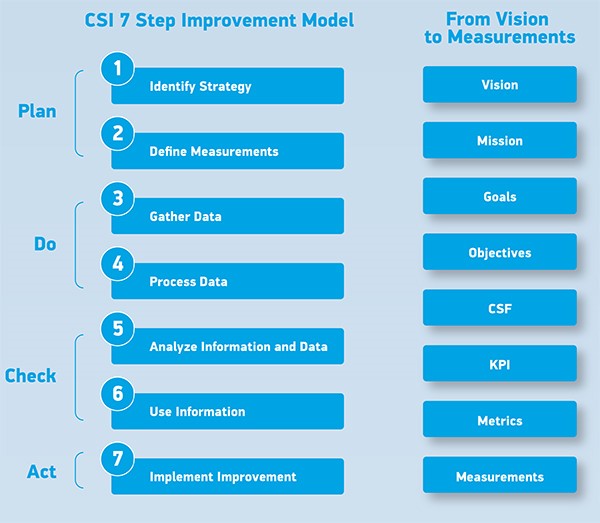
Jul 08, 2016
This is the metrics approach to improve the services. Despite being a separate ITIL module it can be successful only, if integrated with every part of the ITIL life cycle.
The key task is to figure out which of the metrics should be observed. Thus for each service we need to understand what the critical success factors (CSF’s) are. In order for any of the processes or services to be successful CSF’s must be recognized. In general a process or service may have up to five CSF’s.
W. Edwards Deming developed a Plan-Do-Check-Act approach on which Continual Service Improvement is based on. This helps develop out Key Performance Indicators (KPI’s). Below are the questions we need to ask:
- What is the vision? The long term objective.
- Where are we now? The current KPI values.
- Where do we want to be? Where would we like our KPI’s to be?
- How do we get there? How can we get there?
- Did we get there? Did our KPI’s after implementation show an improvement?
- How do we keep up the momentum? How can we keep getting better?
CSI uses a 7-step process to collect and use the data:
- Define the objectives.
- Determine what to measure.
- Collect the data.
- Process the data.
- Analyse the data.
- Present and use the information.
- Implement improvement.

With this will come improvement in all areas of service delivery. It is unlikely for any organisation to have adequate resources to fulfil all the changes. Thus it will be important to have a CSI register to prioritise the most significant ones and implement those in a required order.
Thus the CSI cycle is perhaps the most important as it is an all-rounder and need to be applied to all area of the service life cycle to be successful.
How do your Excel skills stack up?
Test NowNext up:
- Working with Styles – Part 2
- Create cascaded drop-downs in Microsoft Access forms
- PowerShell Basics Series – Measuring objects (Part 2)
- How to omit dates in an Excel chart axis
- 5 posts to help you become a better communicator
- SharePoint 2016 social features
- How-To series: Password protect sections in OneNote 2013
- Managing for excellence: An innovative approach to managing performance
- How-to: Give access to a list only in SharePoint 2013
- PowerShell Basics Series – Manipulating strings
Previously
- Honesty at work
- Search for a Worksheet Function in Excel
- Providing feedback for user interactions
- Working with Styles – Part 1
- Millennial Musings
- View Types in SharePoint
- How to Establish a Creative Workforce
- Managing your Azure subscription using PowerShell
- Make a Form Read-Only in Access
- Diamond, Volcano or Pulp











